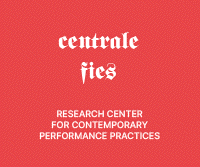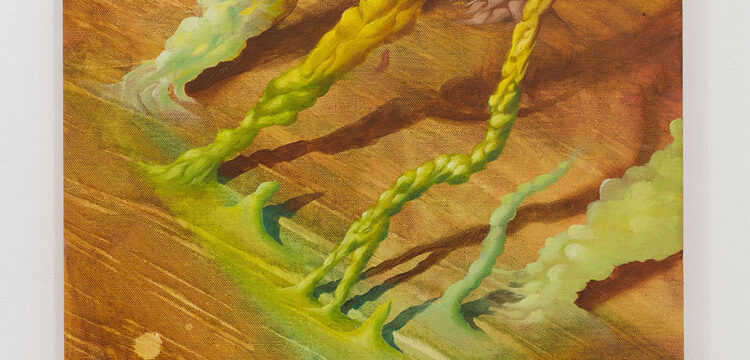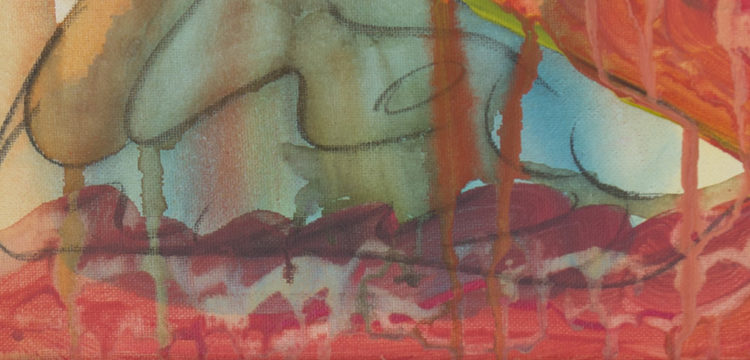Shadows
Notes towards an unfinished novel
Shadows incorporates writings, quotes, references and methodologies that Bogdan Ablozhnyy used in his research while working on his recent exhibition The Other at BALENO, Rome. In a juxtaposition of concepts and memories, Ablozhnyy reveals the complex editorial process that is at the base of his artistic practice. Here are some notes that Ablozhnyy used to make on index cards since last year, shuffled in one of the many possible plots, almost in the same way as they were scattered around books, tables, beds, flats, different cities and people’s lives. Some of them are being in the closest proximity with his works, some are rather abrupt and being a part of the so-called personified literary experience (fictional homoerotic novel in P. Klossowski and M. Jouhandeau tradition ha-ha), life long, yet unfinished and continuous that come along with personal history, real and fictional events, characters, biographies and minds—a certain look of the mind and the body and what attended and clothed and awakened and received it: other minds, other bodies, others. Who were they? Marina Tsvetaeva, of course, but also Alexander Ilyanen, Pavel Tchelitchew, Mikhail Kuzmin, Marie Bashkirtseff, Yevgeny Kharitonov, Y., E., L., H., A., A., A.
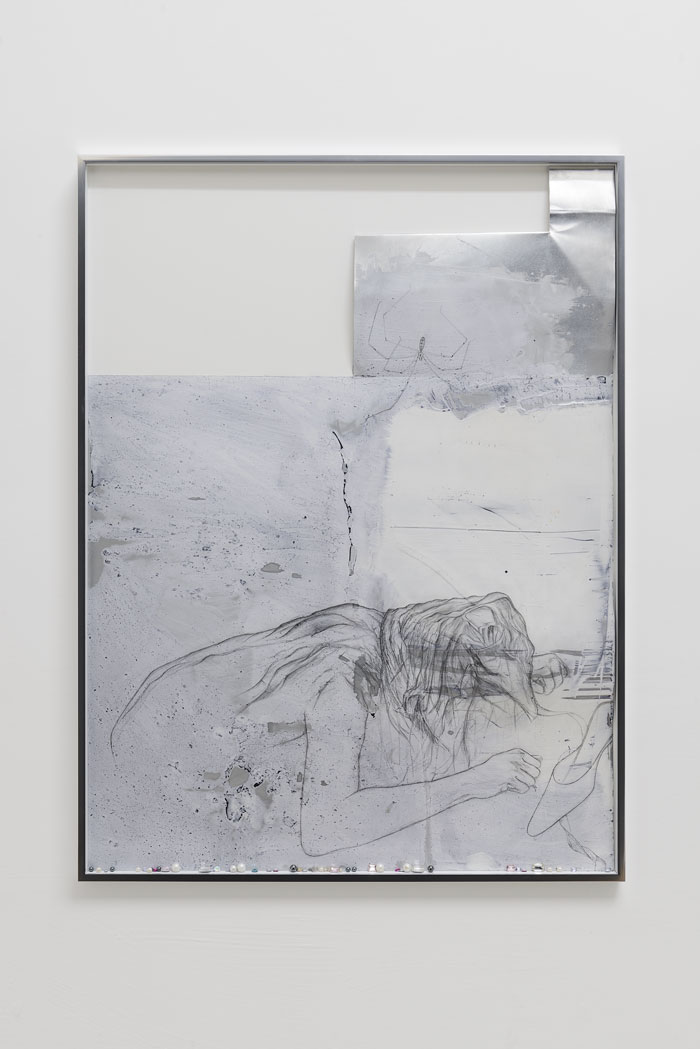
I have read your book. I feel close to you, as to all women who write. Don’t take offense at being included among my “all”: all of them do not write, only certain do. And so, I am close to you, as to any rare person, especially any rare person who is a woman. I have been thinking of you since the day I saw you—has it been a month? When I was young, I was eager to explain myself to others; I was afraid of missing the wave rising from within to carry me toward the other; I was always afraid of loving no more, of knowing no more. But I am no longer young and I have learned to let almost everything go—irrevocably.
—Marina Tsvetaeva, Mon frère féminin, 1932
3 AM
For a long time I couldn’t fall asleep thinking it over and over again. Nothing is more distressing than a thought that escapes itself, than ideas that fly off, that disappear hardly formed, already eroded by forgetfulness or precipitated into Others. These are infinite variabilities, the appearing and disappearing of which coincide. They are infinite speeds that blend into the immobility of the colorless and silent nothingness they traverse, without nature or thought. This is the instant of which we do not know whether it is too long or too short for time… (we constantly lose our ideas)
But only in order to doubt, a few pages later, whether any novel could ever rival the sober genius of a few lines of news in brief: ‘Yesterday, at four o’clock, a young woman threw herself into the Seine at the Pont-des-Arts.
—J. Rancière Aisthesis: Scenes from the Aesthetic Regime of Art
24/05
the Other
(prelude)
A scene in Proust’s text where M. sees an aeroplane for the first time in his life and bursts into tears.
“I was as deeply moved as an ancient Greek on seeing for the first time a demi-god. I wept—for I had been ready to weep the moment I realized that the sound came from above my head (aeroplanes were still rare in those days), at the thought that what I was going to see for the first time was an aeroplane …meanwhile the airman seemed to be uncertain of his course; I felt that there lay open before him—before me, had not habit made me a prisoner—all the routes in space, in life itself”; he flew on, let himself glide for a few moments over the sea, then quickly making up his mind, seeming to yield to some attraction that was the reverse of gravity, as though returning to his native element, with a slight adjustment of his golden wings he headed straight up into the sky but M’s soul was filled with an incomprehensible and at the same time clear to him feeling of another life: not the life that he lives, not the life that is familiar, and not the life that can be guessed (because with our imagination we can guess what we can call another life, but in reality it is not another life but an extension of our imagination)
1. Our imagination, as has often Proust said, “cannot imagine an unfamiliar situation, because our imagination is making up of familiar elements even unfamiliar”
2. We cannot, in principle, naturally escape from the entanglement of familiar to us elements, something must help us, or we must help ourselves. So this imaginary other is not “another”. And in the sensation that he associated with the sound of the gliding plane, he felt a completely abstract, vague, but overflowing joy of feeling another life, “the Other”, that is, the other self and so on.
3. I am telling you this so that you could catch this feeling through Proust, or perhaps through my story, which is certainly awkward and incompetent compared to Proust’s text, with the feeling that you could be different. But even if you do not become different, this very feeling may affect what happens to you in (this) life.
—Merab Mamardashvili, Lectures on Proust (1981-1984)
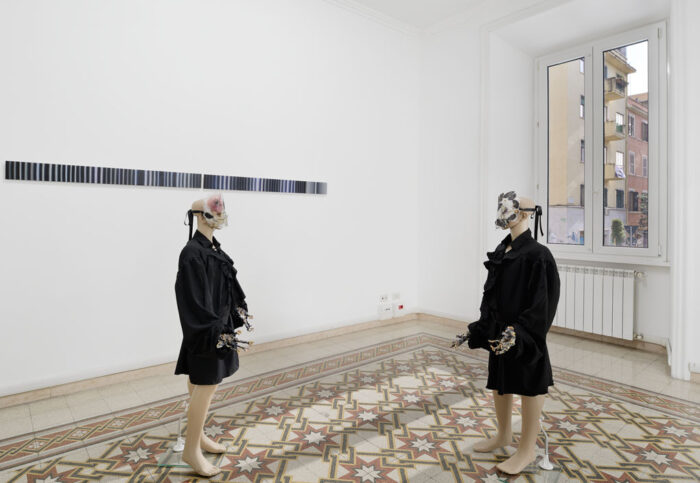
19/10
games of mirroring, of duplication, of reversed identification and projection, always in the mode of the double
Does anyone ever choose life? (I must be living twice)
“You are always a different person.”—F. Nietzsche The Gay Science
the Other can be associated with the image outside oneself perceived and identified within the Mirror-stage (mirror-stage misrecognition)—“The I is always in the field of the Other.”—J. Lacan
Double—by liberation and capture
(I was the shadow of the waxwing slain)
23:44
*Little did I know that I become just a projection*
27/11
(According to Kristeva) the abject marks a “primal order” that escapes signification in the symbolic order; the term is used to refer to the human reaction (horror, vomit) to a threatened breakdown in meaning caused by the loss of the distinction between subject and object, or between the self and the other.
“The remains of a tepid rain were still sifting down when we stepped out into the street.
Betsy looked a fright. The bloom was gone from her cheeks and her drained face floated in front of me, green and sweating. We fell into one of those yellow checkered cabs that are always waiting at the kerb when you are trying to decide whether or not you want a taxi, and by the time we reached the hotel I had puked once and Betsy had puked twice.
The cab driver took the corners with such momentum that we were thrown together first on one side of the back seat and then on the other. Each time one of us felt sick, she would lean over quietly as if she had dropped something and was picking it up off the floor, and the other one would hum a little and pretend to be looking out the window.
The cab driver seemed to know what we were doing, even so.
‘Hey,’ he protested, driving through a light that had just turned red, ‘you can’t do that in my cab, you better get out and do it in the street.’
But we didn’t[…]”
—Sylvia Plath The Bell Jar
02/09
time as the affection of self by self
a space between an action and a reaction (affect)
affect as a transitory thought or thing that occurs prior to an idea or perception
what can happen if my body is made this way, a certain relation of movement and rest which subsumes an infinity of parts?
he always asks what we are capable of, what’s in our power?
what is common to the affecting body and the affected body?
to live on the edges, at the limit of your own power of being affected
it’s inevitable: a blue that is too intense for my eyes will not make me say it’s beautiful
in what does the body which affects me and my own body agree?
3/06
(empirical phantasy)
the Other is the condition for our passing from one world to another.
“… we will consider a field of experience taken as a real world no longer in relation to a self but to a simple “there is.” There is, at some moment, a calm and restful world. Suddenly a frightened face looms up that looks at something out of the field. The Other appears here as neither subject nor object but as something that is very different: a possible world, the possibility of a frightening world. This possible world is not real, or not yet, but it exists nonetheless: it is an expressed that exists only in its expression-the face, or an equivalent of the face. To begin with, the other is this existence of a possible world.
… here, then, is a concept of the Other that presupposes no more than the determination of a sensory world as a condition. On this condition the Other appears as the expression of a possible. The Other is a possible world as it exists in a face that expresses it and takes shape in a language that gives it a reality.
… the concept of the Other as the expression of a possible world in a perceptual field leads us to consider the components of this field for itself in a new way. No longer being either subject of the field or object in the field, the Other will become the condition under which not only subject and object are redistributed but also figure and ground, margins and centre, moving object and reference point, transitive and substantial, length and depth. The Other is always perceived as an other, but in its concept it is the condition of all perception, for others as for ourselves.
… the creation of a concept of the Other with these components will entail the creation of a new concept of perceptual space, with other components to be determined.”
—Gilles Deleuze, Félix Guattari, What Is Philosophy?
25/07
The Plane, The Horizon, The Void, Nothing
14:05
9 seconds
8 seconds
11 seconds
11,4 seconds
12 seconds
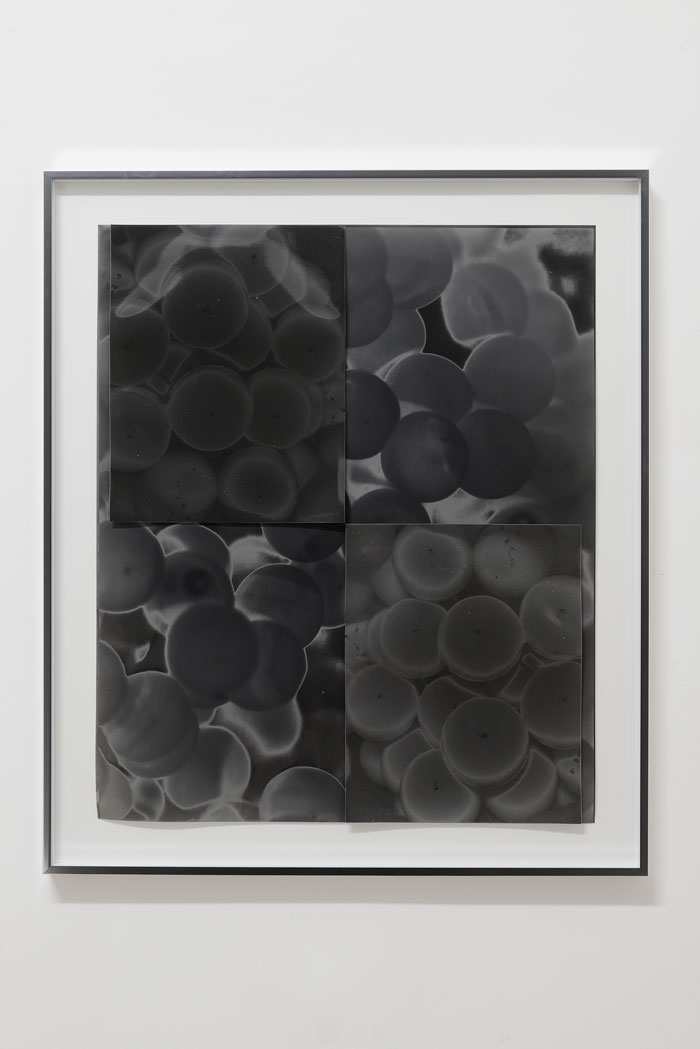
11/04
a frieze group (in mathematics) is a class of infinite discrete symmetry groups of patterns on a strip (infinitely wide rectangle), hence a class of groups of isometries of the plane, or of a strip. A symmetry group of a frieze group necessarily contains translations and may contain glide reflections, reflections along the long axis of the strip, reflections along the narrow axis of the strip, and 180° rotations.
Laurent Schwartz Dirac delta function—equals to zero everywhere except for zero where it equals to infinity
1/12
ideas on relative motion:
as long as I’m standing still all of my motion is through time
motion through space affects the passage of time
time runs at different rates
time is separate from us
the sharp difference we see between past, present and future may only be an illusion
if time could be thought in relation to space, the past, the present and the future could be predicted geometrically, since the time speed (in space) may vary
these and all other events that I think of happening in the same moment in time but in different places make up what I intuitively think of as now
26/11
Perceiving occurs in flashes—flashes of arrival (the arrival of the perception) and flashes of disappearance.
Ultimately, one perceives nothing.
Nothing, however, is something
a large or small hole
a puncture,
a gap,
a void,
an abyss,
empty space between visible stars
brief silence between words.
But it is also an aperture or portal; the opening into impossibility, or sheer potentiality.
It is happening.
—Lyn Hejinian
26/08
Mars Black
Pluto Blue
Jupiter Grey
Neptune Blue
Mars Brown
Venetian Red
Space Blue
Tropic Sunrise, Magic Green
Flash Green
Russian Green Earth
Verona Green Earth (The sites in the mountains north of Verona have been known since ancient times. The bluish best quality of Verona is no longer accessible since the landslide of 1922, in the aftermath of the great earthquake. The earths accessible today are comparable to the historical medium or poorer qualities)
Lapis Armenius
Azurite Blue
Lapis Lazuli, grayish-blue
Cavansite (calcium vanadium silicate from the Poona area in India. The turquoise, transparent mineral crystallizes in needles. Whether this colour was ever used in Europe is beyond our knowledge, however some Mughal miniatures look like this sky blue pigment was used)
Lapis Lazuli (The natural ultramarine extracted from lapis lazuli was used in prehistoric times. It has been compared to gold throughout history, both by its price and its aura. The raw stone comes from the north of Afghanistan, and the pigment, of incomparable colour and quality, is obtained through a difficult process in which the stone is kneaded with a resin)
Ultramarine Ash (is produced during the manufacture of Fra Angelico Blue and is suitable for underpainting Lapis Lazuli)
Diamond Powder, approx. 250 µ
Pearl Dust
Iron Oxide Red
Iron Glimmer Gray
Graphite Silver
15/09
A note to the Frieze – Recurring:
(Recurring in dreams, but also recurring time)
How to describe that time?
Those moving, elusive layers of time, passages of time of one’s life in their subtle touch with other lives, with the absolute time.
They, like streams of dense fog, envelop you suddenly—memories.
I mean traces of someone’s life—pages, eras, decades in their inviolable contact with the time as an absolutely separate entity.
Where is this connection? Where it passes, draws and touches its boundaries—time in general, everywhere, time without us, time as matter and quantum and time of one’s life.
“…all the lives, works, and deeds that matter were never anything but the undisturbed unfolding of the most banal, most fleeting, most sentimental, weakest hour in the life of the one to whom they pertain.”
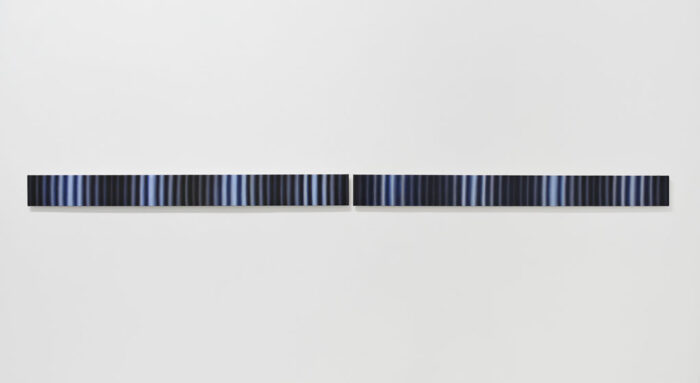
16/09
the connection or articulation of elements that are separated
de Rougemont’s Penser avec les mains can be read as a virulent attack against the traditional belief that thought and action are disjointed (“Where I create is where I am true” Rilke. […] Some think, other acts. But man’s true condition is to think with his hands.”)
07/06
(There’s a lot that painting cannot do). Can it be intangible, disparate, indispensable, rigorous, animate, can it be a threat, longing, slippage, remembered expectations, a condition or a regard, a thing or a place, arrays of figures and objects, the fleeting, the contingent and the ephemeral?
08/06
Can a drawing be irrevocable, disconcerting, dismembered, unreliable, recurrent, expansive, vague and simultaneously very direct, can it be a dedication, section of time, negation, closure, mental paradigm or empirical phantasy?
30/06
“You”
I couldn’t see you yet—You, my shadow
You
You
Also You
You could be seen only through You
Earth and water shadow
02/09
“j’etais persuadé, que des fêtes de ce genre prolongent la vie des gens, et nous font tournoyer dans les rets du mystère.”
—Constantin Paustovski : Histoire d’une vie V, Incursion dans le Sud
“My mother taught me not to talk to strange men.
But I always do. ”
—TWA: TWA Theme
13/09
‘You see—the world,’ said I.
‘You turn your head—but the splendid clarity of your intelligence, and the remorseless honesty of your intellect (these Latin words I owe you; these qualities of yours make me shift a little uneasily and see the faded patches, the thin strands in my own equipment) bring you to a halt. You indulge in no mystifications. You do not fog yourself with rosy, yellow clouds.’
31/07
I first met Jean on a street corner. He was a stranger to me. But he was also so dear to me since the moment I saw him. A stranger so dear to you so that you might feel so loose and unsure about everything you ever thought was true. We didn’t say a word, we just draw stares in a long pause of our both eyes.
What happened after and how did we actually meet with Jean?
(the gaze is more important than the object)
06/12
22
“My love was deep and therefore lasted only the space of one second, unable to expand in more than one dimension at a time. The same way deeper meaning may constrict a sentence right out of the language into an uneasiness with lakes and ponds. In language nothing is hidden or our own, its light indifferent to holes in the present or postulates beginning with ourselves. Still, you may travel alone and yet be accompanied by my good wishes.”
—Rosmarie Waldrop, Lawn of Excluded Middle
18:46
and inevitably the Other is in the repetition of the Same.
a pure difference and a complex repetition
a veritable double bears the maximal modification appropriate to a double
it is the masked, the disguised or the costumed which turns out to be the truth of the uncovered. Necessarily, since this repetition is not hidden by something else but forms itself by disguising itself;
Persona – personae (derives from Latin, where it originally referred to a theatrical mask)
7/09
“It is the ante-room, winding as the halls of the Pyramids, of Divine’s temporary tomb. This cavernous hypogean rises up, pure as the bare marble arm in the darkness which is devouring the queen to whom it belongs. Coming from the street, the stairway mounts to death. It ushers one to the final resting−place. It smells of decaying flowers and already of the odor of candles and incense. It mounts into the shadow. From floor to floor it dwindles and darkens until, at the top, it is no more than an illusion blending with the azure. It is Divine’s landing. While in the street, beneath the black haloes of the tiny flat umbrellas which they are holding in one hand like bouquets, Mimosa the First, Mimosa the Second, Mimosa the half−Fourth, First Communion, Angela, Milord, Castagnette, Regine, in short, a host, a still longer litany of creatures who are glittering names, are waiting, and in the other hand are carrying, like umbrellas, little bouquets of violets which make one of them lose herself, for example, in a revery from which she will emerge bewildered and quite dumbfounded with nobility, for she (let us say First Communion) remembers the article, thrilling as a song from the other world, from our world too, in which an evening paper, thereby embalmed, stated: “The black velvet rug of the Hotel Crillon, where lay the silver and ebony coffin containing the embalmed body of the Princess of Monaco, was strewn with Parma violets.”
—Jean Genet, Our Lady of the Flowers
27/07
Transatlantic accent (she’s been asked at various times and in various places whether she’s from Paris, London, New York, Berlin… she is from the Metropolis, in her case—Alphabet city. She’s transatlantic):
Travail(s)
buying ugly shit
tell me, you charming girl,
Russian émigré
mon frère
15/08
her notebooks could also be called LIES
The word of a snail on the plate of a leaf?
It is not mine. Do not accept it.
Acetic acid in a sealed tin?
Do not accept it. It is not genuine.
A ring of gold with the sun in it?
Lies. Lies and a grief.
—S. Plath The Couriers
19/06
[too personal, I can’t put it here]
20/06
Dream
What defines the paranoid/schizoid position into which we are born in all it’s terrible fragility are five things: the first is the inability of the self to comprehend or tolerate ambivalence (Freudian omnipotence)
A group of people, it seems to me only one of them I can identify (V.). They are starting having sex. It is three or four of them. An important detail—a blowjob with a condom (Blowjob 1964). I walk away and fall down the labyrinth.
The Labyrinth concept: the ability to get lost in order to meet again.
“O my brothers, I heard a laughter that was no human laughter”.
—F. Nietzsche Thus Spoke Zarathustra
15/01
a Dream Within a Dream
“…we can draw a dream out of it, we can have this dream on several levels. You dream, and a kind of wizard is there who makes you enter a palace; this palace… it’s the dream of Apollodorus told by Leibniz. Apollodorus is going to see a goddess, and this goddess leads him into the palace, and this palace is composed of several palaces. The labyrinth of continuity. This palace is in the form of a pyramid. Then, I look closer and, in the highest section of the pyramid, closest to the point, I see a character who is doing something. Right underneath, I see the same character who is doing something else in another location. Again underneath the same character is there in another situation, as if all sorts of theatrical productions were playing simultaneously, completely different, in each of the palaces, with characters that have common segments. You understand, what he means is that at each level is a possible world.”
—Gilles Deleuze, Lectures on Leibniz (22/04/1980)
16/01
[also too personal; or maybe just not strong enough]
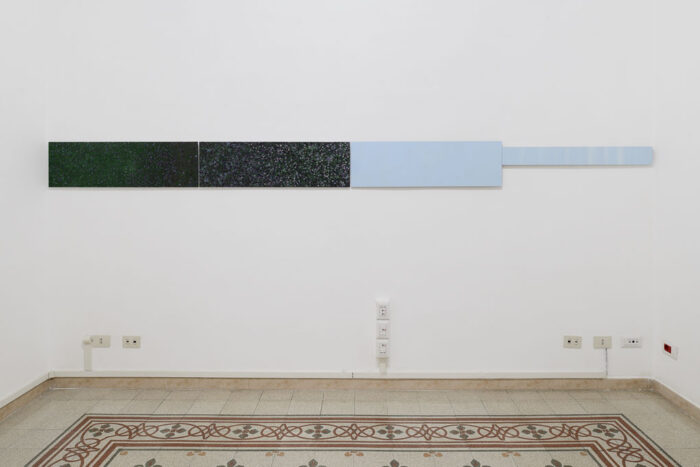
17/01
The wooden wall piece The Frankfurt Kitchen (Restaged version of Jeanne Dielman) is almost like a back side of a theatre decoration in original Petra von Kant play version (all the action is happening in one setting/endless telephone scenes) As if these two figures staged in a space (served as “figures” or “actors” in a locked room or section of time) just left this stage. But it is also a kitchen cabinet in the colors of Jeanne Dielman movie (worn-out beige).
“I have all this ludicrous cabinetry in my kitchen basically underneath which is the Tenement Museum. I keep thinking about Russia cause that’s what it’s like. Russia in the 90s was deeply worn. It was almost a colour”
—Eileen Myles, For Now
08/02
long periods of pain and then short moments when…
25/12
The correspondances are the data of remembrance—not historical data, but data of prehistory (Frieze – 10,000 years ago). What makes festive days great and significant is the encounter with an earlier life;
The images of caves and végétation, of clouds and waves which are evoked at the beginning of this second sonnet rise from the warm vapour of tears, tears of homesickness.
“The wanderer looks into the tear-veiled distance, and hysterical tears [sic] well up in his eyes,” writes Baudelaire in his review of the poems of Marceline Desbordes-Valmore.
30/11
possibility of knowledge
The ‘problem’ in question is how we can know of the existence of other minds since any mind as such is not directly evident to sensory perception
‘theory of mind’(ability to recognise that other people have minds, and thence to make deductions concerning what the other person may be thinking).
But for Hegel the awareness that I myself am also an object of thought for this Other, who will be making their own assumptions about my thoughts, produces an effect resembling two mirrors turned to face each other, each reflecting the other down a tunnel of repeated images into infinity.
10/02
no passage, not a single way out… instead an element of awakening with pictures, an element that is constantly repeated in new ways (what could be painfully thought as a loss*)
*Monika’s tears on a phallic tree. Almost like in the Lacanian Paradox, where phallus represents a signifier without a signified and something that could never be obtained (because it wouldn’t be that). Lack (or rather a signifier of the lack). Phallus is the very S1, behind which there is no signified. The signified (S1) is absent, since the object of desire, for the sake of which in Lacan’s version of Oedipus the Mother leaves the child, is initially imaginary. Subsequently, the lack of this object is symbolized by this S1, which, in fact, does not refer to anything at all. That is why, immediately after the primary repression (refoulement originaire), there arises what Deleuze called the Lacanian Paradox. This paradox lies in the fact that the primary repression creates an imbalance in the signifying and the signified series (or rather, creates an excess in the signifying series and a deficiency in the signified). We cannot get what we want.
“Je te demande de me refuser ce que je t’offre parce que ce n’est pas ça” (I ask you to deny me in what I give (offer) you, because it wouldn’t be that)
26/08
factual and fictional deviations of memory
much closer to forgetting than to remembering
life as it was remembered by the one who had lived it
“Cocteau recognized what really should have been the major concern of all readers of Proust and yet has served no one as the pivotal point of his reflections or his affection. He recognized Proust’s blind, senseless, frenzied quest for happiness. It shone from his eyes; they were not happy, but in them there lay fortune as it lies in gambling or in love”.
—W. Benjamin, The Image of Proust
It is as near as to an autobiography I will ever write. It’s not an autobiography in the literal, but only in the intellectual sense.
30/08
Picnic on the side of the road, in a curb. A strange settlement in the distance. Misty river with tall red clay banks. There’s a sort of commune there. S. didn’t want to take a tram (a tram in this clay desert). Then we leave. Passing by something like a Parisian café (in this clay desert again) but there was also that scene inside while waiting—I was looking at white porcelain and marble reliefs, some were also painted in lilac and very gently light violet hematite colors, marble peacocks or birds of paradise resembling them, lace, all these details I found again the next day in the same place. Way (back) through the museum (that is something between Matyushin’s House and Wade Guyton), a chess table and throwing an ashtray at someone with a gold chain (the ritual of throwing his slips out of the window). Missed train to Moscow (or to Petersburg).
And the last entries in the red notebook are made in Russian:
05/08/1989
“A word, madness, Vadim. Gostiny Dvor. A date is not that secret, but not that obvious, in front of everyone. People are standing and waiting in front of closed doors. People are coming. Anya is coming from Gatchina. Come, I say, late in the evening someday. And the train disappeared. The doors have closed. Next year.
In the meantime went to the bathhouse at the corner of Stremyannaya and Marata street, five fractions seven. Movie Posters. American, French, Russian. A pool there, small as an ice-hole, right after the steam room. And there the sky opens. Right where the church used to be. Yesterday we went to a bathhouse at Dostoevskay. With a young man I met at the MS [Moscow Station]. Face like in variolla after eels, dreadfully dire and attracting. A face of a toad with emerald eyes or of a Greek deity, an enchanted character from French fairy tales, shoulders covered with blue patches, pink, purple, ulcers, his beret, yellow jacket, white trousers, a legend, picks up cigarette butts on the stairs and smokes. This will be next year. Next February.
Intentions, even the most disastrous, always remain in there. Surreal. Oh, we, like Natasha [Rostova], in torment and doubt, let a former Cadet take us to the house where the stairs… next to the bathhouse, for twenty-five. Theatre of Cruelty: Une vie.”
—Alexander Ilyanen’s The Road to U (in my humble translation)
***
Like shadows, these incarnations of one’s memory, now also your memory, once inherited, drawn and bequeathed, read on a page and lived through in one’s mind are scattered here around in this non-chronological order, in a plot constructed intuitively just to shed a glimpse of light opposing them on an image that has left much space for the expectations and psychodramas [of the artist in his art] …just as dreams are always en route to somewhere else and you are fortunate if you can retain the moment of remembrance before the present envelopes you and grabs all your attention.



